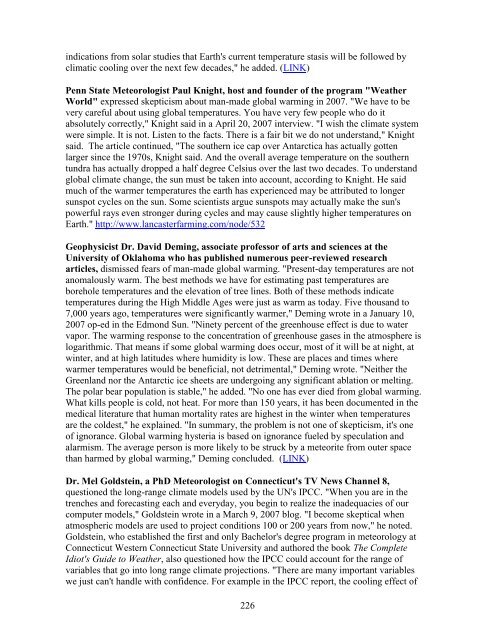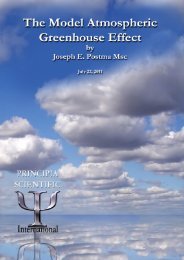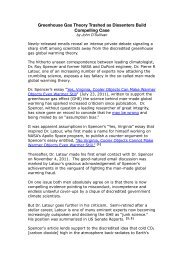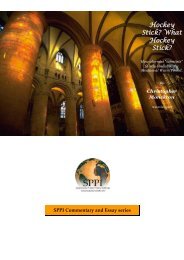Than 1000 International Scientists Dissent Over Man-Made Global ...
Than 1000 International Scientists Dissent Over Man-Made Global ...
Than 1000 International Scientists Dissent Over Man-Made Global ...
Create successful ePaper yourself
Turn your PDF publications into a flip-book with our unique Google optimized e-Paper software.
indications from solar studies that Earth's current temperature stasis will be followed by<br />
climatic cooling over the next few decades," he added. (LINK)<br />
Penn State Meteorologist Paul Knight, host and founder of the program "Weather<br />
World" expressed skepticism about man-made global warming in 2007. "We have to be<br />
very careful about using global temperatures. You have very few people who do it<br />
absolutely correctly," Knight said in a April 20, 2007 interview. "I wish the climate system<br />
were simple. It is not. Listen to the facts. There is a fair bit we do not understand," Knight<br />
said. The article continued, "The southern ice cap over Antarctica has actually gotten<br />
larger since the 1970s, Knight said. And the overall average temperature on the southern<br />
tundra has actually dropped a half degree Celsius over the last two decades. To understand<br />
global climate change, the sun must be taken into account, according to Knight. He said<br />
much of the warmer temperatures the earth has experienced may be attributed to longer<br />
sunspot cycles on the sun. Some scientists argue sunspots may actually make the sun's<br />
powerful rays even stronger during cycles and may cause slightly higher temperatures on<br />
Earth." http://www.lancasterfarming.com/node/532<br />
Geophysicist Dr. David Deming, associate professor of arts and sciences at the<br />
University of Oklahoma who has published numerous peer-reviewed research<br />
articles, dismissed fears of man-made global warming. "Present-day temperatures are not<br />
anomalously warm. The best methods we have for estimating past temperatures are<br />
borehole temperatures and the elevation of tree lines. Both of these methods indicate<br />
temperatures during the High Middle Ages were just as warm as today. Five thousand to<br />
7,000 years ago, temperatures were significantly warmer," Deming wrote in a January 10,<br />
2007 op-ed in the Edmond Sun. "Ninety percent of the greenhouse effect is due to water<br />
vapor. The warming response to the concentration of greenhouse gases in the atmosphere is<br />
logarithmic. That means if some global warming does occur, most of it will be at night, at<br />
winter, and at high latitudes where humidity is low. These are places and times where<br />
warmer temperatures would be beneficial, not detrimental," Deming wrote. "Neither the<br />
Greenland nor the Antarctic ice sheets are undergoing any significant ablation or melting.<br />
The polar bear population is stable," he added. "No one has ever died from global warming.<br />
What kills people is cold, not heat. For more than 150 years, it has been documented in the<br />
medical literature that human mortality rates are highest in the winter when temperatures<br />
are the coldest," he explained. "In summary, the problem is not one of skepticism, it's one<br />
of ignorance. <strong>Global</strong> warming hysteria is based on ignorance fueled by speculation and<br />
alarmism. The average person is more likely to be struck by a meteorite from outer space<br />
than harmed by global warming," Deming concluded. (LINK)<br />
Dr. Mel Goldstein, a PhD Meteorologist on Connecticut's TV News Channel 8,<br />
questioned the long-range climate models used by the UN's IPCC. "When you are in the<br />
trenches and forecasting each and everyday, you begin to realize the inadequacies of our<br />
computer models," Goldstein wrote in a March 9, 2007 blog. "I become skeptical when<br />
atmospheric models are used to project conditions 100 or 200 years from now," he noted.<br />
Goldstein, who established the first and only Bachelor's degree program in meteorology at<br />
Connecticut Western Connecticut State University and authored the book The Complete<br />
Idiot's Guide to Weather, also questioned how the IPCC could account for the range of<br />
variables that go into long range climate projections. "There are many important variables<br />
we just can't handle with confidence. For example in the IPCC report, the cooling effect of<br />
226





